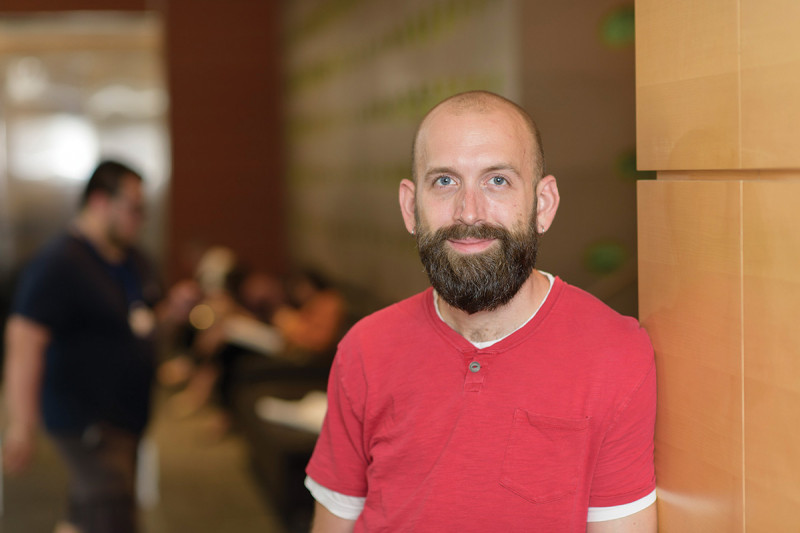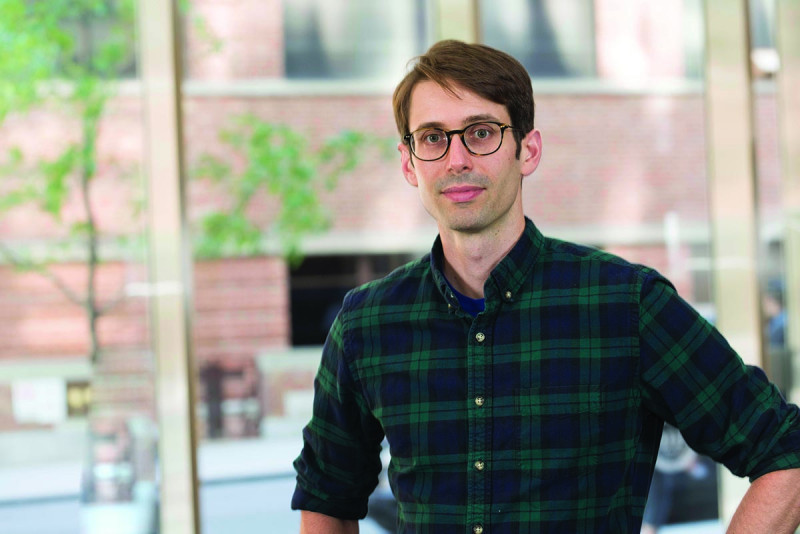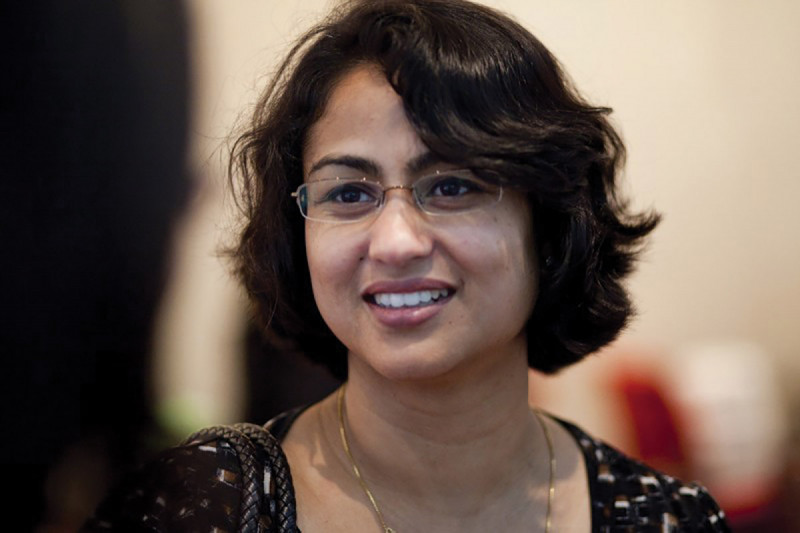In 2004, Memorial Sloan Kettering established an innovative new graduate school — the Louis V. Gerstner, Jr. Graduate School of Biomedical Sciences (GSK). The school’s mission: to train a new generation of scientists to advance the frontiers of biomedical knowledge and bridge the gap between laboratory research and real-life clinical challenges, particularly in cancer.
The first class matriculated in 2006; since then, 38 students have earned their PhD degrees and 68 are currently pursuing their studies under the mentorship of MSK’s nationally recognized scientists and physicians.
We wondered what this group of young scientists has been up to since leaving GSK and caught up with three of them: Semanti Mukherjee, John Maciejowski, and James Mahaffey.
A Return Home
Since earning her PhD degree in 2011, Semanti Mukherjee has witnessed the potential of cancer genomics from the perspective of both academia and industry. Her training in the laboratory of computational biologist Robert Klein launched her into a series of challenging roles in both environments.
This broad experience provided insights into how variations in inherited mutations promote a range of diseases, including cancer. But there’s always been one aspect of her science experience that she values above all else — and that has drawn her back to MSK.
In October, Dr. Mukherjee will join MSK’s Clinical Genetics Service as an assistant attending geneticist and assistant laboratory member. She will conduct genetic research funded by the newly established Robert and Kate Niehaus Center for Inherited Cancer Genomics as well as teach postdoctoral clinical and research fellows and PhD candidates.
“I’ve always loved interaction with students, because they bring in new ideas and ask questions that force you to think in a different way,” she says. “That’s one thing that academia offers that’s missing from industry.”
During her training, Dr. Mukherjee focused on how genetic variations are associated with risk for blood diseases known as myeloproliferative neoplasms (MPNs). Using whole genome sequencing — which can determine a cancer cell’s entire DNA sequence — she played a role in finding a variant in a gene called JAK2 that makes a person more susceptible to developing MPNs.
In addition to receiving guidance from Dr. Klein, she also collaborated closely with medical oncologist Ross Levine of the Human Oncology and Pathogenesis Program. She says these two mentors were an ideal combination.
“Dr. Klein gave me the freedom to think and explore, while making sure I stayed on track,” she says. “He let me ask the big questions but cautioned me to stay realistic — this is your great scientific idea, but how will you test it?” Dr. Levine, she explains, helped her understand MPNs and the therapeutic implications for studying JAK2. “He also taught me the importance of balance — how deep to go into a question before deciding whether you need to change course and pursue a different line of thinking.”
After graduating from GSK, Dr. Mukherjee worked in laboratories at North Shore Long Island Jewish Medical Center (now Northwell Health) and Columbia University, studying underlying genetic factors in schizophrenia. Although she secured a prestigious K99 grant from the National Institutes of Health in June 2013 to transition to a faculty position at an institution in the future, she was later presented with an opportunity she could not pass up: The biotechnology company Regeneron Pharmaceuticals offered her a position that allowed her to analyze huge amounts of genetic data relating to several diseases, including heart disease and obesity.
“In just 18 months, I analyzed data from 50,000 people,” she says. “It illustrates the big advantage of industry, which is that they have the funding and resources to do things that would be impossible at an academic institution. It gave me the hands-on experience I needed.”
At MSK, under the leadership of Kenneth Offit, Chief of the Clinical Genetics Service, Dr. Mukherjee hopes to investigate the relationship between inherited and somatic (acquired) mutations and how they contribute to cancer. She’s optimistic about the prospects for important advances. “In five years, MSK will have sequenced so many cancer patients that we’ll have a rich resource of data to understand genetic variation,” she says.
“It’s such an exciting period, and I’m happy to be on the front lines.”
A Split Decision
John Maciejowski was one of six students in GSK’s founding class. The first thing he says of his GSK education is that “it allowed me to hit the ground running.” He’s not exaggerating: He received his PhD degree in cancer biology on October 31, 2013, and began work the very next day as a postdoctoral fellow in Titia de Lange’s laboratory in cell biology and genetics at the Rockefeller University in New York City, where he’s currently conducting research.
At MSK, he pursued his thesis research in the laboratory of molecular biologist Prasad Jallepalli, focusing on correct chromosome segregation during mitosis, the process by which a cell divides, forming two new daughter cells that each have the same number of chromosomes as the parent cell.
Cells must accurately segregate their chromosomes when they divide and reproduce. If errors occur, the result is cells with an abnormal number of chromosomes — a hallmark of cancer. The condition is known as aneuploidy, Dr. Maciejowski explains: “It is thought to play a significant role in tumor development and points to defects in the cell-cycle machinery.”
At Rockefeller, he extended his research, studying the fate of dicentric chromosomes and their impact on the stability of the genome. In order to understand them, it’s helpful to know a little about telomeres, the stretches of DNA that cap the ends of our chromosomes and that are critical for the stability and maintenance of our genetic information. They’ve been compared to the plastic tips on shoelaces because they keep chromosome ends from fraying and sticking to each other, which would destroy or scramble an organism’s genetic data.
“Telomere crisis” occurs when telomeres are dysfunctional and fuse end-to-end. The event occurs early in the development of cancer, “and that’s one way to get a dicentric chromosome,” says Dr. Maciejowski.
A normal chromosome has one centromere — the part of the chromosome that’s required for segregation during mitosis. It helps build a sort of handle during this phase of the cell cycle: The segregation machinery grabs on to the handle to pull the chromosome into one of the daughter cells. But a dicentric chromosome has two centromeres, which are “engaged in a tug-of-war as the machinery pulls at the chromosome, with each daughter cell claiming it,” he explains. Ultimately, an enzyme called
TREX1 attacks and resolves the dicentric chromosome and viable cells can emerge, but often with chaotically altered genomes.
Dr. Maciejowski described the fate of dicentric chromosomes in human cells and the legacy of telomere crisis in a paper published in Cell in 2015. He showed that dicentric chromosomes produce a particular cascade of events and provided seminal insights into the mechanisms behind cancer development.
Recently, he received the 2016 Regeneron Prize for Creative Innovation. The award, given annually by Regeneron Pharmaceuticals, recognizes one postdoc and one graduate student based on proposals they submit that have the potential to drive biomedical research forward.
He was also honored with the 2016 Tri-Institutional Breakout Prize for Junior Investigators. Cornelia Bargmann of Rockefeller, along with Charles Sawyers, Chair of MSK’s Human Oncology and Pathogenesis Program, and Lewis Cantley of Weill Cornell Medical College, established the prize to recognize and encourage scientists at the outset of their careers.
A Broad Education
While conducting graduate work in the laboratory of MSK developmental biologist Kathryn Anderson, 2014 GSK graduate James Mahaffey came to appreciate the merits of maintaining a broad scientific focus rather than fixating on a narrow research question.
“Her lab has a very open-ended approach for those learning science,” Dr. Mahaffey says. “I learned the importance of pursuing multiple lines of work because you never know if something’s going to produce results or be a dead end.”
It’s a principle that continues to guide his current role as a biochemist doing postdoctoral research at the Perlmutter Cancer Center at NYU School of Medicine. He is studying a gene called RAS, which is mutated in nearly a third of all cancers but has resisted targeting with drugs.
Because the RAS proteins transmit signals from the cell surface to a large number of proteins inside the cell, their effects are complex. Dr. Mahaffey is working to unravel which of these many intracellular processes are essential for cancer cells to survive and grow.
“The approach that I and other researchers are taking is this: We can’t inhibit RAS, so let’s find out what the various RAS proteins normally do,” he says. “I’m looking at what the proteins bind to under specific conditions and trying to identify the pathways that are driving the cancer. Maybe the proteins have ten functions in the cell, but only three are really important for cancer cells.”
The field of biochemistry has been transformed in the last few years by the introduction of CRISPR, a technology that allows researchers to cut and manipulate a cell’s DNA with exquisite precision. “The beauty of this tool is you can take a cancer cell from a person and knock out specific RAS genes and then see how it behaves,” Dr. Mahaffey explains. “This allows you to learn what RAS regulates.”
He says the broad GSK curriculum gave him a leg up in understanding his colleagues’ research. “At GSK, if you want to be a biochemist, you’re still going to learn about immunology and other fields. I feel like I can sit in any meeting and know what’s going on. Someone will mention a weird thing they found in their research and I’ll say, ‘I know a little about that pathway — have you considered this, or looked at these two papers?’”
Dr. Mahaffrey says that Dr. Anderson urged those in her lab to answer scientific questions quickly rather than spending months designing an experiment.
“You never know what’s going to happen, so you might as well start six things and hope a couple take off,” he says. ys.


